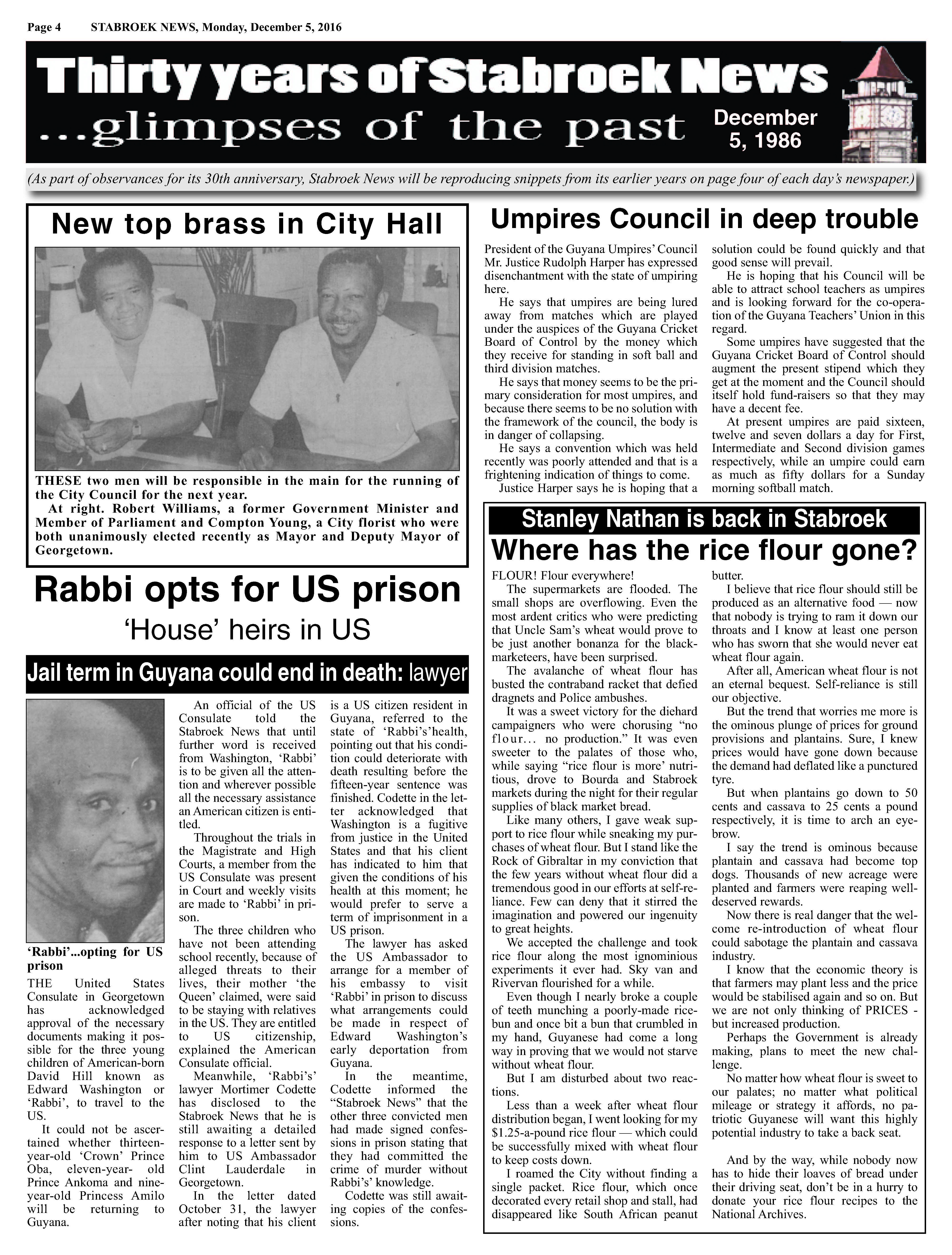President of the Guyana Umpires’ Council Mr. Justice Rudolph Harper has expressed disenchantment with the state of umpiring here.
He says that umpires are being lured away from matches which are played under the auspices of the Guyana Cricket Board of Control by the money which they receive for standing in soft ball and third division matches.
He says that money seems to be the primary consideration for most umpires, and because there seems to be no solution with the framework of the council, the body is in danger of collapsing.
He says a convention which was held recently was poorly attended and that is a frightening indication of things to come.
Justice Harper says he is hoping that a solution could be found quickly and that good sense will prevail.
He is hoping that his Council will be able to attract school teachers as umpires and is looking forward for the co-operation of the Guyana Teachers’ Union in this regard.
Some umpires have suggested that the Guyana Cricket Board of Control should augment the present stipend which they get at the moment and the Council should itself hold fund-raisers so that they may have a decent fee.
At present umpires are paid sixteen, twelve and seven dollars a day for First, Intermediate and Second division games respectively, while an umpire could earn as much as fifty dollars for a Sunday morning softball match.
Stanley Nathan is back in Stabroek News
Where has the rice flour gone?
FLOUR! Flour everywhere!
 The supermarkets are flooded. The small shops are overflowing. Even the most ardent critics who were predicting that Uncle Sam’s wheat would prove to be just another bonanza for the black- marketeers, have been surprised.
The supermarkets are flooded. The small shops are overflowing. Even the most ardent critics who were predicting that Uncle Sam’s wheat would prove to be just another bonanza for the black- marketeers, have been surprised.
The avalanche of wheat flour has busted the contraband racket that defied dragnets and Police ambushes.
It was a sweet victory for the diehard campaigners who were chorusing “no flour… no production.” It was even sweeter to the palates of those who, while saying “rice flour is more’ nutritious, drove to Bourda and Stabroek markets during the night for their regular supplies of black market bread.
Like many others, I gave weak support to rice flour while sneaking my purchases of wheat flour. But I stand like the Rock of Gibraltar in my conviction that the few years without wheat flour did a tremendous good in our efforts at self-reliance. Few can deny that it stirred the imagination and powered our ingenuity to great heights.
We accepted the challenge and took rice flour along the most ignominious experiments it ever had. Sky van and Rivervan flourished for a while.
Even though I nearly broke a couple of teeth munching a poorly-made rice-bun and once bit a bun that crumbled in my hand, Guyanese had come a long way in proving that we would not starve without wheat flour.
But I am disturbed about two reactions.
Less than a week after wheat flour distribution began, I went looking for my $1.25-a-pound rice flour — which could be successfully mixed with wheat flour to keep costs down.
I roamed the City without finding a single packet. Rice flour, which once decorated every retail shop and stall, had disappeared like South African peanut butter.
I believe that rice flour should still be produced as an alternative food — now that nobody is trying to ram it down our throats and I know at least one person who has sworn that she would never eat wheat flour again.
After all, American wheat flour is not an eternal bequest. Self-reliance is still our objective.
But the trend that worries me more is the ominous plunge of prices for ground provisions and plantains. Sure, I knew prices would have gone down because the demand had deflated like a punctured tyre.
But when plantains go down to 50 cents and cassava to 25 cents a pound respectively, it is time to arch an eyebrow.
I say the trend is ominous because plantain and cassava had become top dogs. Thousands of new acreage were planted and farmers were reaping well-deserved rewards.
Now there is real danger that the welcome re-introduction of wheat flour could sabotage the plantain and cassava industry.
I know that the economic theory is that farmers may plant less and the price would be stabilised again and so on. But we are not only thinking of PRICES – but increased production.
Perhaps the Government is already making, plans to meet the new challenge.
No matter how wheat flour is sweet to our palates; no matter what political mileage or strategy it affords, no patriotic Guyanese will want this highly potential industry to take a back seat.
And by the way, while nobody now has to hide their loaves of bread under their driving seat, don’t be in a hurry to donate your rice flour recipes to the National Archives.
Rabbi opts for US prison
‘House’ heirs in US
Jail term in Guyana could end in death: lawyer
THE United States Consulate in Georgetown has acknowledged approval of the necessary documents making it possible for the three young children of American-born David Hill known as Edward Washington or ‘Rabbi’, to travel to the US.
It could not be ascertained whether thirteen-year-old ‘Crown’ Prince Oba, eleven-year- old Prince Ankoma and nine-year-old Princess Amilo will be returning to Guyana.
An official of the US Consulate told the Stabroek News that until further word is received from Washington, ‘Rabbi’ is to be given all the attention and wherever possible all the necessary assistance an American citizen is entitled.
Throughout the trials in the Magistrate and High Courts, a member from the US Consulate was present in Court and weekly visits are made to ‘Rabbi’ in prison.
The three children who have not been attending school recently, because of alleged threats to their lives, their mother ‘the Queen’ claimed, were said to be staying with relatives in the US. They are entitled to US citizenship, explained the American Consulate official.
Meanwhile, ‘Rabbi’s’ lawyer Mortimer Codette has disclosed to the Stabroek News that he is still awaiting a detailed response to a letter sent by him to US Ambassador Clint Lauderdale in Georgetown.
In the letter dated October 31, the lawyer after noting that his client is a US citizen resident in Guyana, referred to the state of ‘Rabbi’s’health, pointing out that his condition could deteriorate with death resulting before the fifteen-year sentence was finished. Codette in the letter acknowledged that Washington is a fugitive from justice in the United States and that his client has indicated to him that given the conditions of his health at this moment; he would prefer to serve a term of imprisonment in a US prison.
The lawyer has asked the US Ambassador to arrange for a member of his embassy to visit ‘Rabbi’ in prison to discuss what arrangements could be made in respect of Edward Washington’s early deportation from Guyana.
In the meantime, Codette informed the “Stabroek News” that the other three convicted men had made signed confessions in prison stating that they had committed the crime of murder without Rabbi’s’ knowledge.
Codette was still awaiting copies of the confessions.





